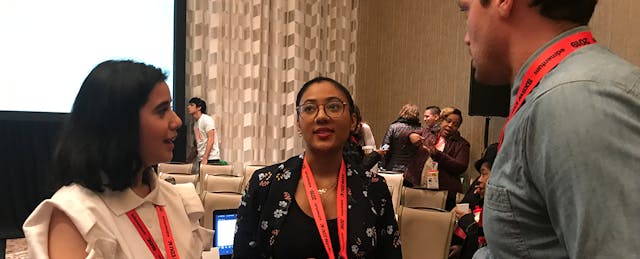When Zuri Gordon received several thick envelopes in the mail saying she got into highly-selective colleges, she hoped her family would be thrilled. But that’s not how it played out.
“My mother would not care—she would say, ‘You’re not going to go there, we can’t afford that,’” Gordon told an audience at SXSW EDU this week, adding that "now I can see she was trying to protect me from getting my hopes up because they knew that they couldn't afford that."
“Getting those acceptances didn’t mean that I had access to higher education,” she added. "And it wasn't any dramatic poverty situation, but getting those acceptances and my financial aid, that's when I really started to understand what level of low-income my family was because they could not pay more than $1,000 a year."
An encouraging college counselor helped her navigate the process of seeking financial aid and scholarships, and explained that her family would likely pay less at an elite private institution—thanks to scholarships and tuition discounts for first-generation and minority students—than they would at state colleges with lower sticker prices.
Gordon eventually landed at Brandeis University. But she quickly felt that the campus was not designed for her, but for students of greater means. She describes herself as “grateful for what I learned” at the university, but also determined to make Brandeis and other colleges better by pushing them to be more welcoming to students like her.
On Wednesday, Gordon co-led a packed “campfire” session at the conference aimed at school and college leaders, titled “Poor Kid at the Rich School: The Cost of Diversity.” She and another recent Brandeis graduate, Gwendolyn Berumen, shared their stories, and led a discussion of how colleges and schools could do better.
“We had a difficult experience, and we don’t want that to happen to other students,” said Berumen.
College Application Process
For both presenters, challenges began during the application process. Since their parents had no prior experience with the ins and outs of getting into college, information felt sketchy or hard to come by.
“I could not name five colleges that I was interested in,” said Gordon, who first heard about some elite colleges by seeing posters in her counselor’s office. Berumen heard of some colleges only because a character on a TV show went there.
Language barriers can also play a role. Berumen said her mother doesn’t speak English, which made it a challenge to explain things like the need to fill out federal financial aid forms. “I didn’t know how to talk about FAFSA in Spanish,” she said.
During a question-and-answer period, one audience member shared that she had struggled as a single mother to navigate the college application process that was unfamiliar to her, and suggested that colleges prepare resource guides for families. “Reaching out to the parents would make a huge difference,” she said.
The Undergraduate Experience
Brandeis did roll out the red carpet for Berumen and some other first-generation students of color, flying them in during the application process for a “diversity weekend.” And she said the college scheduled a variety of multicultural events during that visit and touted their resources for underrepresented students.
When she got to campus, though, things didn’t feel as welcoming. “It was a little bit of false advertising,” she said. “They’re kind of lying about what’s happening there.”
After arriving, both students said they quickly became activists for greater resources, and often found the fight exhausting and a distraction from their studies. At one point, Berumen said, administrators proposed eliminating a women’s resource center, and she expended energy and time working to try to save it.
Gordon said that the only reason the university has an African and African American Studies Department is that black students in the ‘60s held sit-ins to demand it. “This work, it falls on the most marginalized students,” she said. “White students—they were going to class they had time to read and study.”
Another audience member, who shared his experience as a Latino student on a college campus several years ago, said that one thing he struggled with as a student was learning to advocate for himself. He noticed that his white roommate would ask for things like extensions on deadlines for assignments, something that he didn’t realize was even a possibility. "I would lose out on things because I didn’t know how to open my mouth," he said.
Post-Grad Experience
After graduation, the presenters found themselves wrestling with more challenges: struggling to find a job and to understand the debt they had taken on to attend college.
“I did not think about student loans for one second during my time there,” said Berumen, though she noted that she was required to take a thirty-minute online course about the debt as graduation neared. She thought to herself: “I now have to pay back $30,000, and I’m scared.” It took her about six months to find a job.
While Brandeis and other Predominantly White Institutions, or PWIs as many at the session called them, boast extensive alumni networks, those don’t help all students equally, the presenters argued.
“If I’m asking a white man how he got his job, I can’t follow his steps,” said Gordon. “When we send these students out, who is here that they can actually talk to?”
In an interview after the session, Megan Saunders, assistant director of life-transforming programs at the University of Virginia, said that “being here and hearing the emotion of those who have gone through these problems really helped me view the issues holistically and in a solution-oriented way.”
Both presenters said they plan to continue raising the issue and pursuing solutions through their own work. Berumen now works at the Dallas County Community College district, and Gordon works at the Juilliard School in New York City.


